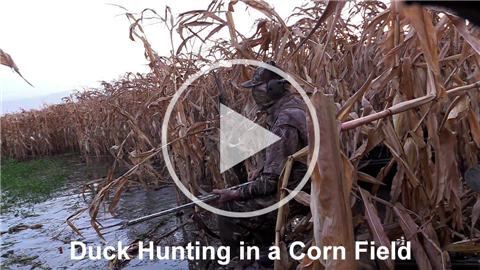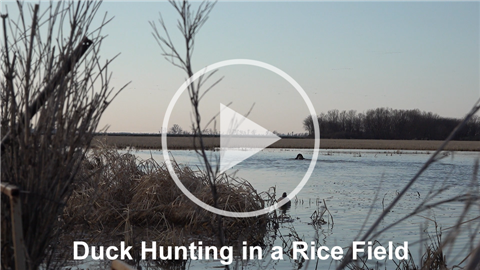Hunting Ducks in a Field (Flooded & Dry Terrain)
Hunting ducks in a field, whether dry or flooded presents hunters with a unique set of challenges and opportunities. Unlike traditional water-based duck hunting, field hunting requires hunters to navigate open spaces where the lack of or the presence of water significantly influences their overall approach to hunting game.
That’s why hunters who want to have a successful hunting session while out in a field need to possess a high level of expertise in various areas, including:
● Being able to properly conceal themselves
● Deploying the correct decoy strategies
● Utilizing proper calling techniques
● Understanding the different environmental factors at play
● Understanding the distinct dynamics of hunting ducks in dry and flooded terrain
To help the average hunter get better at hunting ducks in a field, this article will cover both basic and advanced tips for hunting ducks in each field environment. But before we do that, let’s first take a closer look at each type of terrain and what it has to offer.
A Closer Look at Hunting Ducks in Dry & Flooded Fields
Hunting in a dry field and the overall approach hunters need to take varies greatly to that of hunting for ducks in a flooded field. Here is a quick overview of each field type and the different challenges and opportunities it presents duck hunters with:
Dry Fields
Ducks love water. It’s a big part of their lives as it provides them not only with a habitat for nesting, but it’s also a source of food and safety. And as a result, it’s easy to see why the lack of water in a dry field is a major problem for duck hunters.
When hunting ducks in a dry field, hunters need to adapt and think outside the box of ways to attract ducks closer to their hiding spot. Scouting also becomes of paramount importance as understanding the resting and feeding patterns of ducks in this type of environment is essential.
Another crucial aspect that hunters need to master when hunting in a dry field is staying concealed for long periods of time in large open spaces, where they can easily be spotted.
Flooded Fields
As ducks love water, when hunting in flooded fields, hunters won’t have a problem attracting waterfowl. However, flooded fields present hunters with other challenges, which aren’t seen when hunting in a dry field.
When hunting in flooded fields, hunters need to adapt their strategy, consider the depth of the water, and adjust their decoy placement accordingly. Even the approach hunters take to stay concealed will differ - whether they hunt in a flooded corn or a rice field.
Duck Hunting in a dry field (left) vs. a flooded field (right).
Tips for Hunting Ducks in a Dry Field
Hunting ducks in a dry field requires hunters to take a more strategic approach to overcome the challenges posed by the lack of water. Here are a handful of tips that will make hunting ducks in a dry field easier.
Prioritize Scouting
Before settling on a location, duck hunters should scout the area and identify the feeding and resting behavior of the ducks nearby. This is key to setting up camp in a good location that is regularly visited by the local duck population.
During the scouting phase, hunters should look for any and all signs of duck activity, including feathers, tracks, and droppings. That said, scouting for ducks and knowing exactly what to look out for is easier said than done.
That’s why it’s key for duck hunters to learn how to scout for ducks. When equipped with the right knowledge, the duck scouting process and finding the perfect location for setting up camp will be that much easier.
You Need to Blend with the Environment
In a dry field, hunters don’t have the luxury of using trees and bushes as a way to stay concealed. Instead, they need to take their concealment into their own hands and do a great job at staying hidden if they want to have a chance of coming out of their hunting session successful.
When hunting in a dry field, it is recommended to use natural-looking covers and portable blinds that match perfectly with the earthy landscape of the hunting location. That way, hunters won’t stay out like a sore thumb and will have a much better chance of staying concealed.
Stay Very Still and Patient
Even if you’re well concealed, it’s important to remember that there won’t be much natural concealment around, such as trees and bushes. That’s why it’s crucial for dry field hunters to remain very still and patient while trying to lure in a pack of ducks to their location.
Adjust Your Calling Techniques
Hunting in open spaces such as a dry field requires hunters to make adjustments to their calling technique. In this type of environment, ducks tend to respond quite well to clear and sharp calls. Experts advise that hunters should experiment with a range of different calls and see which type of calling technique the ducks respond the best to.
Don’t Neglect Decoy Placement
With no water in sight, hunters need to take their decoy placement to a whole different level, or else, they may fail to attract ducks. When it comes to decoy placement in a dry field, hunters should opt for realistic field decoys that mimic ducks feeding and use them to create a natural-looking spread. When placing the decoys, consider the wind direction and other behavioral patterns to make the area look convincing for potential targets.
Sign up for the Duck Hunting TV Newsletter:
Sign up for the Duck Hunting TV Newsletter:
Tips for Hunting Ducks in Flooded Corn & Rice Fields

Flooded corn and rice fields make for excellent hunting grounds due to the abundance of food and shelter around. Still, they present hunters with their own unique set of opportunities and challenges. Here are the best tips for hunting ducks in a flooded field.
Scout for Feeding Areas
Ducks use water as one of the primary sources of food. That’s why when learning how to hunt ducks in a corn field, one of the first things hunters need to master is scouting for feeding areas. The same applies when duck hunting in a rice field.
Once a feeding area has been identified, all the hunter needs to do is set camp, conceal themselves, and patiently wait for the ducks to return.
Adjust Decoy Spread
It’s a known fact that ducks who feed in the water tend to stick closer together. So, adjusting the decoys accordingly allows hunters to mimic a situation where ducks are already feeding, which will entice actual ducks to flock to the spot and land in the water.
Pay Attention to the Depth of the Water
One mistake hunters make during a flooded corn field duck hunting session is setting up camp and their decoys in deep water. This is largely because ducks prefer shallow waters. So, before setting up camp, it’s widely recommended for hunters to first explore the area and gain a better understanding of how deep the water is in the area.

Conclusion
Learning how to hunt ducks in a field - be it a dry or a flooded one certainly takes practice. But when equipped with the right information, duck hunters can deploy more specific strategies and tailor their approach. And as a result, their chances of having a more successful hunting session will increase.








